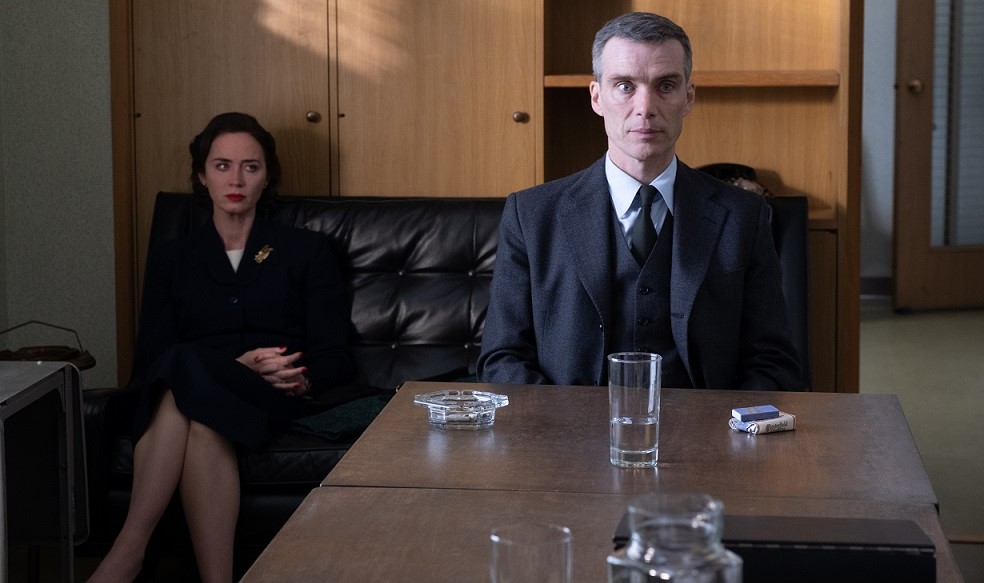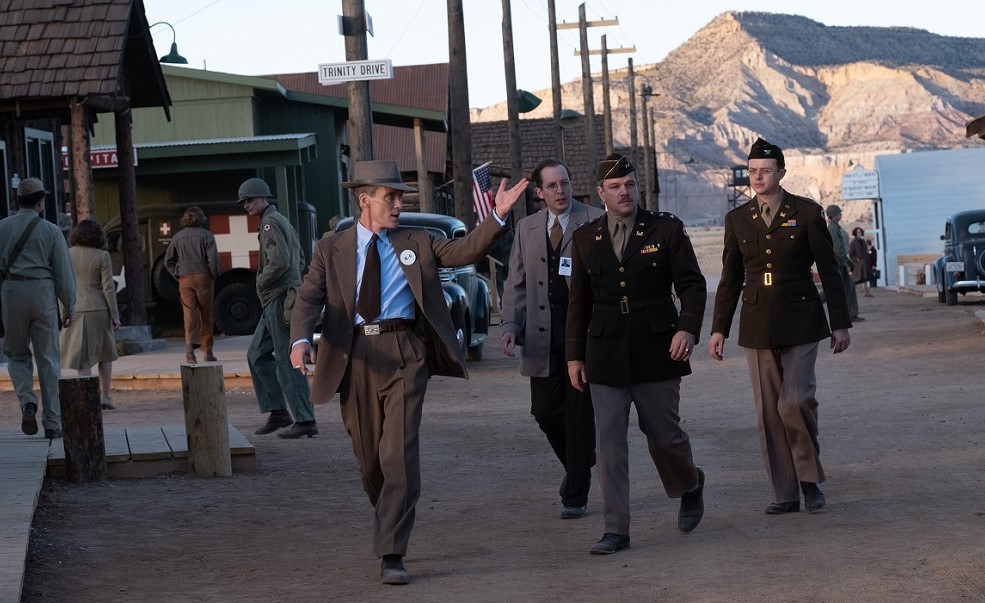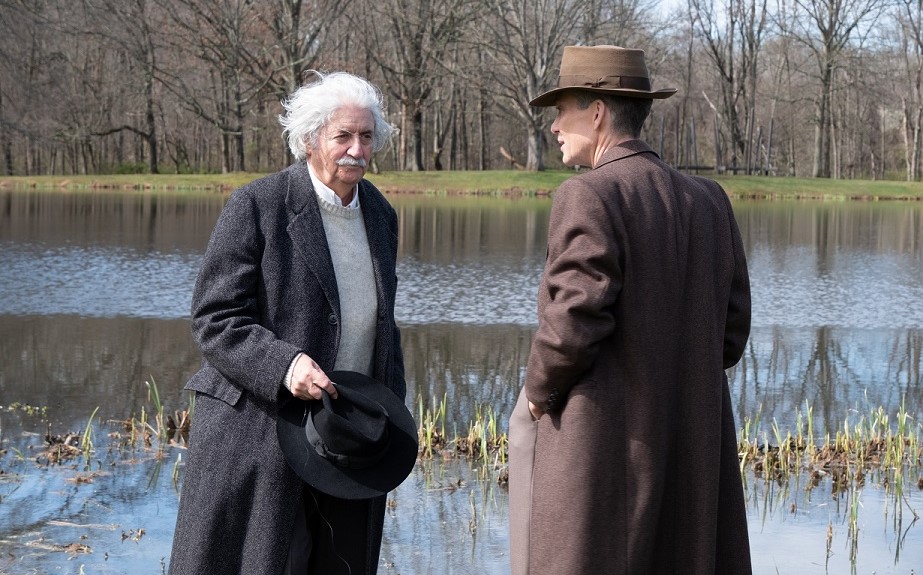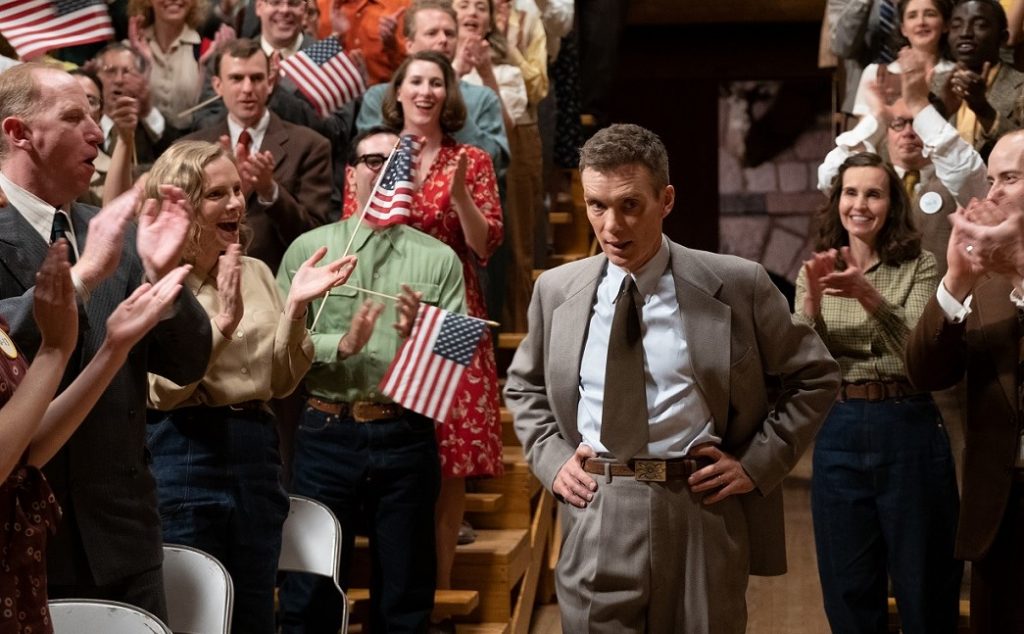
This feature film from Universal Pictures opens exclusively at theaters on July 21st.
Running Time: 180 minutes
Every so often, an event occurs that changes the course of history. The Manhattan Project, which ultimately resulted in the development of nuclear weapons certainly qualifies. Oppenheimer, the newest film from writer/director Christopher Nolan (The Dark Knight, Inception, Interstellar, Dunkirk, Tenet), tells this story through the eyes of the atomic bomb’s creator, focusing on the intense work and toll that it ultimately took on his life. In comparison to some of the filmmaker’s epic thrillers, this feels like a more low-key drama focusing on conversation and interpersonal conflict. Yet Nolan manages to add a palpable sense of tension to the events and once again delivers a memorable cinematic experience.

The story frequently jumps between a few different time periods. It details the early studies of Robert Oppenheimer (Cillian Murphy) in theoretical physics, as well as his relationships with wife Katharine (Emily Blunt), girlfriend Jean Tatlock (Florence Pugh). We also see his interactions with Lewis Strauss (Robert Downey Jr.) and Albert Einstein (Tom Conti) at the Institute for Advanced Study in Princeton, in addition to his work on the Manhattan Project in the Los Alamos Laboratory in New Mexico under General Leslie Groves (Matt Damon). Also intercut into the narrative are a series of security hearings after WWII in which the protagonist is treated as a threat to national security, along with Strauss’ attempt to be nominated to Cabinet of the United States some years later. While some of these subplots initially seem unrelated, they do all end up coming together.
Admittedly, this is a talky picture and it takes some time to get up to speed on what is occurring during the different eras presented in the story. The confident and occasionally arrogant womanizer Oppenheimer isn’t the warmest protagonist in the world, nor for that matter is wife Katharine. However, the unique editing style does keep events from becoming dry and straightforward. Instead, the approach generates suspense by teasing bits and pieces without giving everyone’s motives away.

There is a lot of drama in the narrative, including the lead’s personal peculiarities and professional concerns. There is also his connection to the communist movement, the potential future impact of his weapon, as well as the possible presence of a Russian spy within his group of coworkers. The film also delivers some political scheming as Oppenheimer finds himself at the center of a massive project involving numerous departments. The direct and blunt figure is forced to deal with strong personalities and manipulations from forces all around, even after the project comes to a close.
While the subplot involving the lead’s love life isn’t the most relatable and the approach to drama is a little chilly, the cast are convincing in their portrayals. Murphy looks the part of Oppenheimer and is able to elicit sympathy even when the character isn’t at his personal best. Blunt does an excellent job of helping viewers understand Katharine’s frustrations with her husband’s choices, particularly at work. When the movie focuses on the race to build the atom bomb, Strauss’ run for congress and investigations of Oppenheimer by government figures, it is consistently tense and foreboding. Additionally, a mystery involving a private conversation between Oppenheimer and Einstein is cleverly handled and delivers a convincing observation.

And as expected, there are plenty of striking visuals. Yes, there is a jarringly rendered atomic blast, but there are more memorable images as Oppenheimer’s visions pop into his head and particles float across the screen. When the character becomes racked with worries about the bomb’s detonation and begins experiencing fractured apparitions as crowds cheer him for his potentially devastating accomplishment the screen presents some jolting shudders and shakes.

Most biopics provide simplified versions of their subject, presenting them as either straightforward heroes or villains. Oppenheimer is different in that it decides to show many of the contradictions, complexities and altering opinions of its protagonist. In the end, it’s a compelling portrait that presents the painful ramifications of taking a part in a project that has ultimately changed the world.


